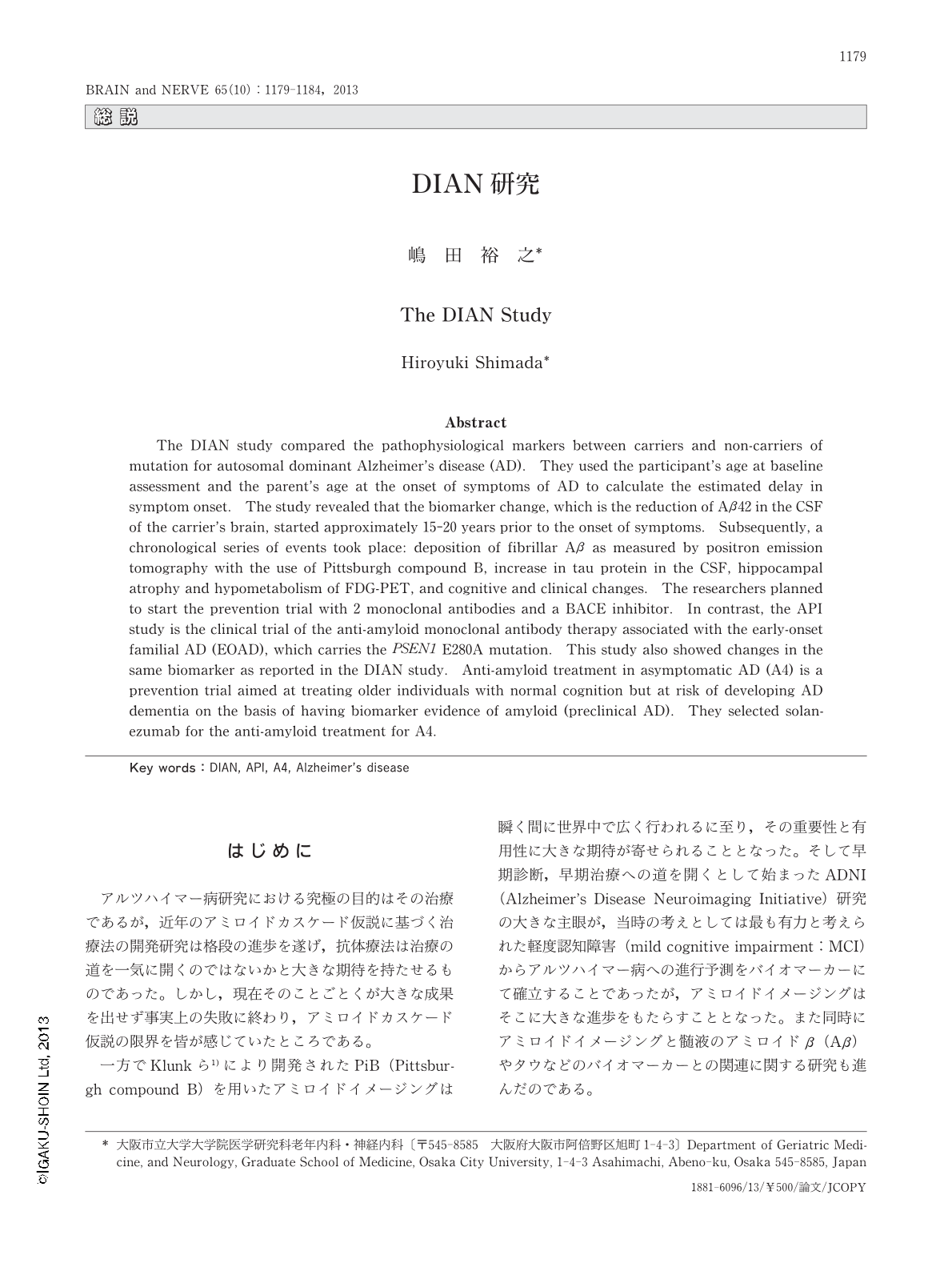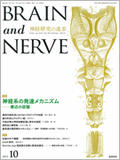Japanese
English
- 有料閲覧
- Abstract 文献概要
- 1ページ目 Look Inside
- 参考文献 Reference
はじめに
アルツハイマー病研究における究極の目的はその治療であるが,近年のアミロイドカスケード仮説に基づく治療法の開発研究は格段の進歩を遂げ,抗体療法は治療の道を一気に開くのではないかと大きな期待を持たせるものであった。しかし,現在そのことごとくが大きな成果を出せず事実上の失敗に終わり,アミロイドカスケード仮説の限界を皆が感じていたところである。
一方でKlunkら1)により開発されたPiB(Pittsburgh compound B)を用いたアミロイドイメージングは瞬く間に世界中で広く行われるに至り,その重要性と有用性に大きな期待が寄せられることとなった。そして早期診断,早期治療への道を開くとして始まったADNI(Alzheimer's Disease Neuroimaging Initiative)研究の大きな主眼が,当時の考えとしては最も有力と考えられた軽度認知障害(mild cognitive impairment:MCI)からアルツハイマー病への進行予測をバイオマーカーにて確立することであったが,アミロイドイメージングはそこに大きな進歩をもたらすこととなった。また同時にアミロイドイメージングと髄液のアミロイドβ(Aβ)やタウなどのバイオマーカーとの関連に関する研究も進んだのである。
そしてアミロイドイメージング研究で次に着目されたのは健常高齢者におけるアミロイド沈着の意義である。それがアミロイドイメージングを含む種々のバイオマーカーを用いた大規模な研究により,アミロイド沈着のある健常高齢者をアルツハイマー病発症の予備軍として捉えられる可能性が出てきたのである。その考え方の背景にあるのがDIAN(dominantly inherited Alzheimer network)研究2)である。またその後,治療的な介入に関して種々の大規模研究が計画され,実施されようとしている。
本稿ではDIAN研究を中心に,今後行われる予定となっている臨床試験のAPI(Alzheimer's prevention Initiative),A4(anti amyloid treatment in asymptomatic Alzheimer disease)研究も合わせて概説する。
Abstract
The DIAN study compared the pathophysiological markers between carriers and non-carriers of mutation for autosomal dominant Alzheimer's disease (AD). They used the participant's age at baseline assessment and the parent's age at the onset of symptoms of AD to calculate the estimated delay in symptom onset. The study revealed that the biomarker change, which is the reduction of Aβ42 in the CSF of the carrier's brain, started approximately 15-20 years prior to the onset of symptoms. Subsequently, a chronological series of events took place: deposition of fibrillar Aβ as measured by positron emission tomography with the use of Pittsburgh compound B, increase in tau protein in the CSF, hippocampal atrophy and hypometabolism of FDG-PET, and cognitive and clinical changes. The researchers planned to start the prevention trial with 2 monoclonal antibodies and a BACE inhibitor. In contrast, the API study is the clinical trial of the anti-amyloid monoclonal antibody therapy associated with the early-onset familial AD (EOAD), which carries the PSEN1 E280A mutation. This study also showed changes in the same biomarker as reported in the DIAN study. Anti-amyloid treatment in asymptomatic AD (A4) is a prevention trial aimed at treating older individuals with normal cognition but at risk of developing AD dementia on the basis of having biomarker evidence of amyloid (preclinical AD). They selected solanezumab for the anti-amyloid treatment for A4.

Copyright © 2013, Igaku-Shoin Ltd. All rights reserved.


